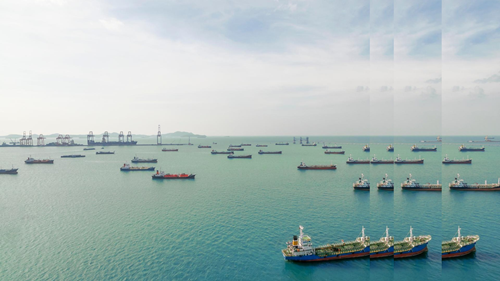CSRD implementing act at risk of not being passed – Implications for German companies
The Directive (EU) 2022/2464 of 14 December 2022 on sustainability reporting by corporations (Corporate Sustainability Reporting Directive, CSRD) should have been implemented by the German legislator by 6 July 2024.
A bill by the Federal Ministry of Justice has been on the table since 22 March 2024, and on 24 July 2024, the Federal Cabinet approved the bill. However, the chances of it being passed are very slim due to the lack of agreement in the German Federal Parliament and the current government crisis.
After the first reading in October, at which various industry associations and companies were also consulted, SPD and Bündnis 90/Die GRÜNEN agreed on an amended version. Last week, however, the decision on it was postponed again. CDU/CSU believes that the directive must be renegotiated at European level because it places a disproportionate burden on companies and creates red tape. Following the collapse of the coalition, the progress of the legislative procedure in this current term is very uncertain, and it seems unlikely to be completed by 21 December 2024.
The European Commission already initiated treaty infringement proceedings against Germany and 16 other Member States on 26 September 2024 (see our report) and will expect a response from the German government.
CSRD implementation status
On 6 December 2023, France was the first European country to transpose the new directive into national law. The current state of implementation can be viewed on the EU law portal EUR-Lex (Directive - 2022/2464 - EN - EUR-Lex).
The CSRD has already been implemented in the following additional countries: Bulgaria, Croatia, Czech Republic, Denmark, Finland, France, Hungary, Ireland, Italy, Liechtenstein, Lithuania, Norway, Romania, Slovakia, Sweden, although the Commission has nevertheless initiated treaty infringement proceedings against some states (e.g. Sweden and the Czech Republic) for delaying application.
Other countries in the European Economic Area (EEA) are in the process of adapting their implementation plans to the CSRD requirements, although there are certainly differences in implementation.
Impact of non-implementation on companies
Failure to implement the CSRD by the deadline does not mean that companies are directly obliged by the CSRD to prepare and publish a CSRD report. At the moment, the current legal status applies only to companies concerned, even if the legal status is not CSRD-compliant.
Legal limits on the retroactive effect of a future implementing act
An implementing law is unlikely to be applied retroactively for the year 2024 due to the constitutional prohibition of retroactivity in Article 20 of the German constitution (Grundgesetz – GG) (prohibition of “genuine” retroactivity). According to the established case law of the Federal Constitutional Court (Bundesverfassungsgericht – BVerfG), genuine retroactivity is generally excluded. This also applies to the implementation of EU directives. The Federal Constitutional Court has admitted exceptions in cases of genuine retroactivity, especially if changes in the law were to be expected. However, this on its own is not enough. There must also be overriding reasons of public interest.
However, the companies concerned may have to produce and publish a report as early as 2025, even if the implementing act is not enacted until sometime in 2025. This is because, according to the established case law of the Federal Constitutional Court as well, where the incriminating legal consequences of a law only occur after its promulgation, but are factually linked to a set of circumstances that have not yet been concluded (events of the current financial year), this constitutes a “non-genuine” retroactivity, which is not impermissible in principle. However, the admissibility of a law with non-genuine retroactivity is also subject to strict requirements. The legislators must weigh the public interests pursued by the implementing act against the individual company’s reliance on the continued validity of the legal situation. In doing so, the principle of proportionality must also be observed.
This is also the conclusion reached in a legal opinion commissioned by the German Institute of Auditors (IDW).
Current reporting obligations continue to apply
As long as the implementing act is not in force, the currently applicable provisions for non-financial reporting will continue to apply for companies, which means that listed companies as well as large credit institutions and insurance companies with an average of more than 500 employees per year will still be required to provide a non-financial report for the 2024 financial year in accordance with the applicable rules of the German Commercial Code (Handelsgesetzbuch – HGB).
In the bill, the reporting requirement for very large companies starting from 1 January 2024 was also meant to be adopted on 8 November 2024. The question of constitutional admissibility has not been raised. This is likely to be the case next year as well.
However, these reports are not subject to any external mandatory audit. The auditors are formally only required to check whether the non-financial report is available (section 317(2) of the German Commercial Code). The substantive audit obligation remains only with the supervisory board of the reporting company (section 171(1) of the German Stock Corporation Act (Aktiengesetz – AktG)). The supervisory board can commission an external review of the content in terms of the plausibility of the report (a full audit is not legally required).
Should a voluntary report be produced?
If the law is not passed by the end of 2024 (and the current provisions therefore still apply), the question is whether companies should still voluntarily produce a full report in accordance with the European Sustainability Reporting Standards, or ESRS for short (Delegated Regulation (EU) 2023/2772 of 31 July 2023) and have it audited in order to at least exempt their subsidiaries abroad.
If no central voluntary CSRD report is prepared, the subsidiaries in the countries where the CSRD has already been implemented would still have to prepare their own report, provided they fall within the scope of application.
It is worth noting, however, that the CSRD allows companies to temporarily deviate from certain disclosure requirements in the first years of reporting. However, if a report that is fully compliant with the CSRD is voluntarily produced and published, it is possible that the corresponding financial year could be considered the first reporting year within the meaning of the Directive. The consequence could then be that the transition periods for the planned simplifications begin as early as the start of voluntary reporting. Companies considering such a step should therefore carefully consider the implications of voluntarily producing a CSRD report.
Impact on reporting under the German Supply Chain Due Diligence Act (Lieferkettensorgfaltspflichtengesetz – LkSG)
The government’s CSRD implementation bill (Art. 3) contained an amendment to section 10 of the German Supply Chain Due Diligence Act stating that companies publishing a CSRD report, either compulsorily or voluntarily, do not have to additionally produce and submit a supply chain due diligence report to the Federal Office for Economic Affairs and Export Control (Bundesamt für Wirtschaft und Ausfuhrkontrolle – BAFA). This would be a welcome simplification of the current legal situation.
As long as the CSRD is not implemented, companies that fall within the scope of the German Supply Chain Due Diligence Act will still have to prepare a supply chain due diligence report, even though the Federal Office for Economic Affairs and Export Control has stated in its FAQ (item 13.3) that it will check whether the supply chain due diligence report is available and has been published for the first time as of 1 January 2026 (we reported on this). Accordingly, a supply chain due diligence report still has to be produced. However, it is enough to submit and publish the report for the year 2023 or 2024 by 31 December 2025.
However, the Federal Office for Economic Affairs and Export Control emphasises that the fulfilment of the other due diligence obligations in sections 4 to 10(1) of the German Supply Chain Due Diligence Act, as well as their control and penalising by the Federal Office, for which information from a report may also provide grounds, are not affected by this cut-off date rule. Consequently, at least the declaration of principle in section 6(2) of the German Supply Chain Due Diligence Act must still be published. In this respect, the Federal Office for Economic Affairs and Export Control has already begun to write to companies based on risk to ask about the implementation of the risk analysis and the preparation of the declaration of principle.
Future implementing act and EU Commission’s reform plans
A new CSRD implementation act is not expected until after the election of the German Federal Parliament, i.e. in autumn 2025 at the earliest. If the act is implemented, all large companies within the meaning of section 267 of the German Commercial Code would have to produce a sustainability report for 2025 and have it audited.
Meanwhile, at a press conference, President of the EU Commission Ursula von der Leyen announced she would streamline the provisions of the CSRD, CSDDD and the EU Taxonomy Regulation in a cross-regulation legislative act (to be known as the “Omnibus Regulation”), albeit without cancelling the basic obligations. This is a response to the Europe-wide complaints by economic players which have primarily criticised the excessive red tape. Although it may become easier to produce such reports, companies will still be obliged to report on sustainability in the future.
Please feel free to contact us on this topic.
Well
informed
Subscribe to our newsletter now to stay up to date on the latest developments.
Subscribe now










